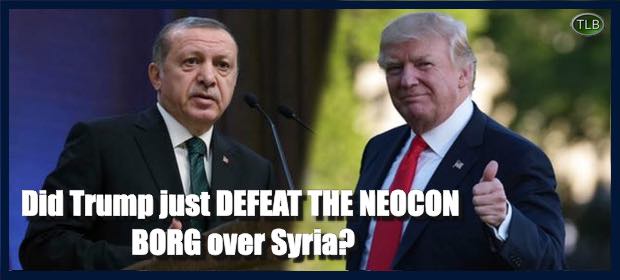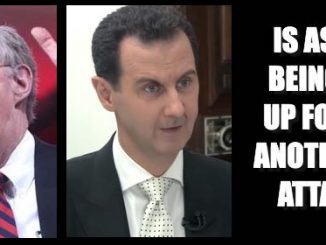
The Real Reason Trump Decided To Pullout of Syria
Trump decided that preventing Turkey from leaving NATO, and from joining a deeper alliance with Russia, China and Iran, was more important than to further fool around at the margins of the Middle East.
MOON OF ALABAMA
Last Friday President Trump had another long phone call with the Turkish President Erdogan. Thereafter he overruled all his advisors and decided to remove the U.S. boots from Syria and to also end the air war.
This was the first time Trump took a decisive stand against the borg, the permanent neoconservative and interventionist establishment in his administration, the military and Congress, that usually dictates U.S. foreign policy.
It was this decision, and that he stuck to it, which finally made him presidential.
 Trump’s National Security Advisor John Bolton, his Secretary of Defense ‘mad dog’ Mattis and his Secretary of State Pompeo were all against this decision (pictured). The specialist working on Syria, the lunatic special representative for Syria engagement James Jefferey and Brett McGurk, the special presidential envoy for the global coalition to defeat ISIS, were taken by surprise. They had worked diligently to install a permanent U.S. presence in a Kurdish-ruled proxy state in northeast Syria.
Trump’s National Security Advisor John Bolton, his Secretary of Defense ‘mad dog’ Mattis and his Secretary of State Pompeo were all against this decision (pictured). The specialist working on Syria, the lunatic special representative for Syria engagement James Jefferey and Brett McGurk, the special presidential envoy for the global coalition to defeat ISIS, were taken by surprise. They had worked diligently to install a permanent U.S. presence in a Kurdish-ruled proxy state in northeast Syria.
While these people first tried to change Trump’s decision, their resistance has now ceased:
Secretary of Defense James Mattis, Secretary of State Mike Pompeo and national security adviser John Bolton met Monday, when Trump was said to formally decide on a US withdrawal from Syria. Multiple US officials argued against an abrupt US withdrawal, but were said to have given up trying to get Trump to change his mind by Tuesday night. US officials began to notify allies of the decision Tuesday. “The push back from DOD, State and NSC stopped [Tuesday] night,” said one regional expert who consults with the US administration, referring to the Department of Defense, the State Department and the National Security Council.
Back in January we already explained why the neoconservative project of a Kurdish proxy state in northeast Syria was doomed from its start:
It is the U.S. supporting the founding of a Kurdish statelet in northeast Syria which is Ankara’s most serious security concern. No [Turkish] “safe zone” will help if the U.S. military continues to build and supplies a Kurdish “border force” that can penetrate Turkey’s southeastern underbelly – now, tomorrow or in ten years. Unless the U.S. stops that project and retreats from the area, Turkey will continue to push against it – if necessary by force.
The Turkish people support the fight against U.S.-supported Kurds and are willing to pay the price for it. The Kurdish YPK leaders are delusional in their demands and overestimate their own political position. The U.S. cannot have both: Turkey as an ally and a Kurdish proxy statelet. It has to decide.
Trump never wanted that project to proceed. He had always wanted to declare victory against ISIS and leave. It was the borg that tried to prevent this and which pushed the project along.
But there are bigger geopolitical fish to fry than such meddling in the Middle East. Trump knows that the United States’ ‘unilateral moment’ after the demise of the Soviet Union, which left the U.S. as the sole superpower, is over. Russia is back and China is rising. Trump’s policy, to adapt to the decreasing U.S. power, is to end the ‘globalization’ that allowed for China’s rapid rise. He wants to geopolitically split this world into two influence spheres. These will be separate from each other in the political, economic, technological and military realms.
In this new big game, Syria’s northeast is just a sideshow and not worth a significant involvement. The much larger Turkey, a U.S. NATO ally for 70 years, is way more important. If Trump had not taken the decision to end the neocon Syria project and to remove the U.S. from Syria, the U.S. would have lost it:
Putting myself into Erdogan’s shoes I would be very tempted to leave NATO and join an alliance with Russia, China and Iran. Unless the U.S. changes course and stops fooling around with the Kurds, Turkey will continue to disentangle itself from the old alliance. The Turkish army has so far prevented a break with NATO, but even staunch anti-Erdogan officers are now on his side.
If the U.S. makes a real offer to Turkey and adopts a new position, it might be able to turn Turkey around and put it back into its NATO fold. Is the Trump White House capable of defying the pro-Israel/pro-Kurdish voices and move back to that realist view?
If it cannot do that, the real answer to the question “Who lost Turkey?” will be obvious.
Trump decided that to prevent Turkey from leaving NATO, and from joining a deeper alliance with Russia, China and Iran, was more important than to further fool around at the margins of the Middle East. It is the right decision.
The Kurdish statelet idea also led to a conflict between the U.S. European Command (EUCOM) and U.S. Central Command (CentCom). Turkey (and Israel) fall under EUCOM, while the Middle East and West Asia are the realms of CentCom. Throughout the last year EUCOM had been increasingly noisy about CentCom’s Syria plans:
Among the critics is General Curtis Scaparrotti, the head of the European Command and the Supreme Allied Commander in Europe. […] During a trip to Washington in March, Scaparrotti huddled with Mattis to express his worries over the growing tensions in U.S.-Turkish relations, worries that the European commander has also expressed in several meetings with General Joseph Votel, his counterpart as head of Centcom.
The concern within EUCOM and NATO was indeed that Turkey would move further towards Russia and, in the end, leave NATO. That is now unlikely to happen. (Since 1991 it was CentCom that played an oversized role in U.S. foreign policy. Sec Def Mattis is a CentCom animal. It is good to see CentCom and him cut to size.)
 But if the hope is that Turkey will end its relations with Russia and Iran, the outcome will be disappointing. Turkey depends on Russian and Iranian gas and as export markets. After the attempted coup against him, Erdogan does not trust the U.S. side. Moreover, the position that gives him the most flexibility and leverage is between the two ‘blocks’, both of which will continue to court him. He will continue to vacillate between them to get the most from both sides.
But if the hope is that Turkey will end its relations with Russia and Iran, the outcome will be disappointing. Turkey depends on Russian and Iranian gas and as export markets. After the attempted coup against him, Erdogan does not trust the U.S. side. Moreover, the position that gives him the most flexibility and leverage is between the two ‘blocks’, both of which will continue to court him. He will continue to vacillate between them to get the most from both sides.
The neoconservative elements in the administration and their Zionist backers have lost out. As Craig Murray describes their aims:
The chaos of this incoherent and counterproductive strategy is, peculiarly enough, what the neocons actually want. Perpetual war and destabilisation in the Middle East is their goal. … Today, by keeping Arab populations poor and politically divided, the neo-cons believe that they enhance the security of Israel, and they certainly do facilitate the access of western companies to the oil and gas of the region, as we see in destabilised Iraq and Libya.
The neoconservative and interventionist borg blew it when it tried to use the temporary U.S. position in Syria against ISIS to goad Trump into a conflict with Iran:
Some current and former US officials faulted what they saw as overreach by administration Iran hawks, in particular US Syria envoy Jim Jeffrey and his lieutenant, Joel Rayburn, the deputy assistant secretary of state for the Levant, who have argued publicly that US forces would not leave Syria until all Iranian forces had left.“The people who work for [Trump] — Bolton, Rayburn, now Jeffrey — make it worse by adding impossible objectives on Syria [involving Iran] that suggest an indefinite stay,” said the US official who called Trump’s decision catastrophic. The official said these arguments have “no connection to realistic objectives for our military” and go “way beyond” the goal of defeating IS and preventing its re-emergence.
But the Iranian presence in Syria is so small and the U.S. position so weak, that this was always a stupid idea:
John Allen Gay, an Iran expert and executive director of the John Quincy Adams Society, [..] argues that Trump’s decision confirms what everyone has quietly admitted for at least the past year: that keeping U.S. forces in Syria to counter ISIS was starting to look like a way for administration interventionists to argue that we should take on Iran.“Keeping the troops there post-ISIS was in part natural mission creep, but it was also a stalking horse for hawks in the administration who want to take on Iran,” he told TAC.
“Yet dangling a few thousand guys in between Turkish forces on one side and Iranians, Russians, and Syrians on the other was never going to be decisive on Iran’s regional role, and it came with real risks and no endgame,” Gay added. “I just don’t think there’s any appetite in the American public for a big fight with Iran anywhere, let alone over Eastern Syria.”
The U.S. State Department is already moving its people out of Syria. The 4,000 to 5,000 U.S. military and contractors were given 60 to 100 days (other sources say 30 days but that is a bit too hasty) to pack up and leave.
They will coordinate with Russia for a handover. There will be Russian advisors that will replace the U.S. Green Berets who command the Kurdish and Arab tribal forces against ISIS. Russia will also try to convince Turkey that there is no further need to invade Syria’s east. It will promise to disarm the Kurdish forces or to integrate them into the Syrian army. Its air force will replace the U.S. and others who currently bomb the 2,000 or so Islamic State fighters left in their holdout along the Euphrates.
The Kurds in Syria will have to make nice with Damascus. They have nowhere else to go. Their dream of an autonomous Rojava will turn out to be just that. Syria can only survive as a centrally controlled state. It will never be federalized. The local Arab tribes in the northeast will probably seek some revenge against the uppity Kurdish leadership that used the U.S. backing to draft their sons into the fight against ISIS. The YPK leadership will likely flee into north Iraq to hide out with their PKK brethren in the Quandil mountains.
The Syrian army, which plans to dislodge al-Qaeda from Idleb governorate during the next spring, will now have to move a number of forces towards the northeast. Isolating the Islamic State at the Euphrates near the Iraqi border and eventually eliminating it, will be the new priority. Iraqi militia will probably help with that. Recovering the oil and gas fields and other economic assets will be another important issue.
Much will depend on how Russia and Iran will be able to handle Turkey. With the U.S. out and the danger of a Kurdish entity in Syria decreasing, they may well be able to convince Erdogan to stop his invasion plans.
It is quite refreshing to see that Trump was finally able to liberate himself from the dictate of the borg. By moving the U.S. out of Syria, he fulfilled one of his election promises.
The people who voted for Trump will welcome the move. One hopes that he can expand on it by further decreasing the influence of Saudi Arabia and Israel on his policies.
During his campaign, Trump also argued for better relations with Russia. But the borg pushed his policies toward the opposite stand. Removing the U.S. from Syria is eliminating one issue where Russia and the U.S. were on opposing sides. Could Trump use his newly found backbone to defeat the borg again and to finally work towards better relations with Russia?
That currently sounds unlikely. But Friday’s decision was a big surprise. Stay tuned for other ones.
************
Original article
ER recommends other articles by Moon of Alabama




